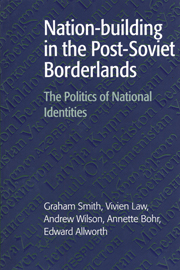Book contents
- Frontmatter
- Contents
- List of figures
- List of tables
- Preface
- The post-Soviet borderland states
- 1 Post-colonialism and borderland identities
- Part I Rediscovering national histories
- Part II Ethnopolitics and the construction of group boundaries
- 5 Nation re-building and political discourses of identity politics in the Baltic states
- 6 Redefining ethnic and linguistic boundaries in Ukraine: indigenes, settlers and Russophone Ukrainians
- 7 The Central Asian states as nationalising regimes
- Part III Language and nation-building
- Notes
- Index
5 - Nation re-building and political discourses of identity politics in the Baltic states
Published online by Cambridge University Press: 01 June 2011
- Frontmatter
- Contents
- List of figures
- List of tables
- Preface
- The post-Soviet borderland states
- 1 Post-colonialism and borderland identities
- Part I Rediscovering national histories
- Part II Ethnopolitics and the construction of group boundaries
- 5 Nation re-building and political discourses of identity politics in the Baltic states
- 6 Redefining ethnic and linguistic boundaries in Ukraine: indigenes, settlers and Russophone Ukrainians
- 7 The Central Asian states as nationalising regimes
- Part III Language and nation-building
- Notes
- Index
Summary
In many cases secession is an attempt to gain independence from a state (in the Soviet case, an empire) that unjustly annexed the territory in question, and annexation is often followed by colonization. If the question is whether the group that was wronged ought to be allowed to reclaim its sovereignty, then neither the colonists nor their descendants have any legitimate voice in that decision. They should be disqualified from voting in the referendum. Whether those non-Latvians who played no part in the original injustice should be compensated for their losses if they are expelled from the newly independent Latvia, or whether a condition of permitting secession should be that all who are currently Latvian citizens (Russians included) are accorded full citizenship rights after secession, is a separate matter.
Allen Buchanan, Secession: The Morality of Political Divorce. From Fort Sumter to Lithuania and Quebec (Boulder: Westview, 1991), p. 143after individuals have entered a certain territory under the justified impression that they will qualify for citizenship, it is unjustified to change these terms retroactively. This is a crucial issue for many republics established after the collapse of the Soviet Union … While the Estonian rage over the Soviet occupation is understandable, creating another wrong will not right the first one. Estonia and Latvia must face the fact that the injustices inflicted on them have turned them into binational states, and there is no way of turning the clock back.
Yael Tamir, Liberal Nationalism (Princeton, NJ: Princeton University Press, 1993), p. 159- Type
- Chapter
- Information
- Nation-building in the Post-Soviet BorderlandsThe Politics of National Identities, pp. 93 - 118Publisher: Cambridge University PressPrint publication year: 1998
- 4
- Cited by

